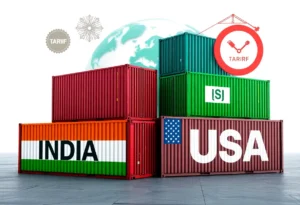GS2 – International Relations

Context:
The United States has invoked emergency trade provisions to levy 50% punitive tariffs on select Indian imports, citing concerns linked to Russia-related security and trade issues.
Reasons Behind the Tariff Hike:
- Geopolitical frictions arising from India’s closer ties within BRICS, continued Russian oil imports, and exploration of alternative payment mechanisms.
- Widening US trade deficit with India.
- Allegations that Indian trade indirectly supports Russia’s war financing and helps bypass sanctions.
Details of the Tariff Move:
- Structure: Tariffs have been doubled to 50%, including a 25% ad valorem surcharge (a duty calculated as a percentage of goods’ assessed value).
- Legal Basis: US invoked WTO Article XXI (security clause) along with domestic emergency trade laws.
- Negotiation Window: India has 21 days to reach a bilateral settlement on tariff terms.
- Tariff Standing: India now faces the highest US tariff globally, surpassing China (30%) and Pakistan (19%).
- Exemptions: Nearly 50% of Indian exports—particularly pharmaceuticals and electronics—remain duty-free.
Likely Impacts on India:
- Loss of Competitiveness: Higher duties make Indian goods costlier compared to competitors.
- Forex Pressure: Potential export slowdown may widen the current account deficit and reduce foreign exchange inflows.
- Diplomatic Strain: Could undermine strategic partnerships and delay bilateral projects.
- Investment Uncertainty: Unpredictable policy shifts may deter FDI and disrupt investor confidence.
- Cost Escalation: Duties on intermediate goods may raise input costs, driving inflation.
Potential Strategic Opportunities:
- Supply Chain Realignment: Tariff diversion may push global firms to integrate India into alternative supply networks.
- Regulatory Reform: External pressure could accelerate ease-of-doing-business measures.
- Geopolitical Leverage: India’s position in a multipolar world could strengthen.
- Make-in-India Boost: Higher import costs may spur domestic production and value addition.
- Service Diplomacy: Opens bargaining avenues in digital trade, cross-border services, and visa policies.




